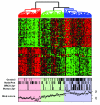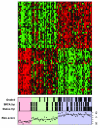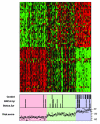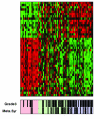Gene expression profiling spares early breast cancer patients from adjuvant therapy: derived and validated in two population-based cohorts
- PMID: 16280042
- PMCID: PMC1410752
- DOI: 10.1186/bcr1325
Gene expression profiling spares early breast cancer patients from adjuvant therapy: derived and validated in two population-based cohorts
Abstract
Introduction: Adjuvant breast cancer therapy significantly improves survival, but overtreatment and undertreatment are major problems. Breast cancer expression profiling has so far mainly been used to identify women with a poor prognosis as candidates for adjuvant therapy but without demonstrated value for therapy prediction.
Methods: We obtained the gene expression profiles of 159 population-derived breast cancer patients, and used hierarchical clustering to identify the signature associated with prognosis and impact of adjuvant therapies, defined as distant metastasis or death within 5 years. Independent datasets of 76 treated population-derived Swedish patients, 135 untreated population-derived Swedish patients and 78 Dutch patients were used for validation. The inclusion and exclusion criteria for the studies of population-derived Swedish patients were defined.
Results: Among the 159 patients, a subset of 64 genes was found to give an optimal separation of patients with good and poor outcomes. Hierarchical clustering revealed three subgroups: patients who did well with therapy, patients who did well without therapy, and patients that failed to benefit from given therapy. The expression profile gave significantly better prognostication (odds ratio, 4.19; P = 0.007) (breast cancer end-points odds ratio, 10.64) compared with the Elston-Ellis histological grading (odds ratio of grade 2 vs 1 and grade 3 vs 1, 2.81 and 3.32 respectively; P = 0.24 and 0.16), tumor stage (odds ratio of stage 2 vs 1 and stage 3 vs 1, 1.11 and 1.28; P = 0.83 and 0.68) and age (odds ratio, 0.11; P = 0.55). The risk groups were consistent and validated in the independent Swedish and Dutch data sets used with 211 and 78 patients, respectively.
Conclusion: We have identified discriminatory gene expression signatures working both on untreated and systematically treated primary breast cancer patients with the potential to spare them from adjuvant therapy.
Figures






References
Publication types
MeSH terms
LinkOut - more resources
Full Text Sources
Other Literature Sources
Medical
Molecular Biology Databases

